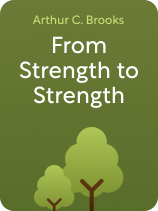
Are you in the second half of your life? Have you thought about how your career might better reflect the stage of life you’re in?
As you get older, certain skills and abilities decline. But, that doesn’t mean that you can’t thrive professionally. Arthur Brooks’s From Strength to Strength is a practical how-to book that can help you think about success differently and find work that suits your changing brain.
Continue reading for an overview of this encouraging and equipping book.
Arthur Brooks’s From Strength to Strength
Management expert Arthur Brooks’s From Strength to Strength says that, as we get older, our professional skills decline and we can no longer succeed in our current jobs. However, he explains, this isn’t something to fear. With the right mindset, the second half of your life can be even happier and more meaningful than the first. If you find a job that suits your changing skill set, and, if you change your idea of “success” from career achievement and material wealth to happiness and fulfillment, you can continue to thrive even as your professional skills decline.
Brooks is a bestselling author, a public speaker, and a Harvard Professor of Management Practice. He’s also a corporate coach specializing in leadership and workplace happiness. His own declining professional skills inspired him to seek out ways to find happiness and fulfillment in his later years. He used what he learned to write From Strength to Strength, which became a #1 New York Times Bestseller immediately upon release. Brooks has also written several other books exploring themes of personal happiness, societal unity, and social progress, and he’s co-authored a self-help book with Oprah Winfrey. He holds a Ph.D. in public policy analysis, as well as honorary doctorates from numerous universities.
We’ll start by explaining how and why you lose your job skills as you get older—and why it might happen much sooner than you think. We’ll then discuss two possible solutions to this problem:
- Finding work that better suits your changing skills
- Rethinking your ideas about success: specifically, pursuing “life success”—living a well-rounded life full of contentment and love—instead of professional success
The Problem: Professional Decline
Brooks begins by saying that, for people working in practically any skilled job, professional decline sets in sometime between their late 30s and early 50s. This means that they start losing their job skills—they can’t think as quickly and solving problems becomes more difficult. Further, if the job is physically demanding, they find themselves becoming physically weaker and more prone to injury.
For example, statistically speaking, scientists and inventors are most likely to make significant breakthroughs before age 40; doing so after age 70 is practically unheard of. Creative professionals like authors and artists tend to succeed for a bit longer, but they still most commonly win awards in their 40s or 50s and then experience sharp declines in their later years.
This decline happens in large part because the prefrontal cortex—the part of the brain that controls higher-order thought processes like reasoning and creativity—starts to shrink around this time. You can’t prevent this from happening, no matter how well you take care of yourself; you also can’t overcome its effects, no matter how hard you work.
Solution #1: Find Work That Suits Your Changing Brain
While professional decline sounds disheartening, Brooks says you can turn this potential deterioration into an opportunity to find new types of success in the second half of your life.
To clarify how a mental decline can lead you to new kinds of success, Brooks first explains that you’re not really getting less intelligent as you age; rather, you’re becoming weaker in some areas but stronger in others. Therefore, to continue being successful in your career, you just need to start relying on a different type of intelligence and find work that suits this different skill set.
We’ll first discuss the two types of intelligence and how they change as we age. Then, we’ll discuss the career shift that Brooks recommends making due to this change.
The Two Types of Intelligence
According to Brooks, British psychologist Raymond Cattell believes there are two different types of intelligence: one that relies on creativity and quick thinking and one that relies on knowledge and experience.
The first type of intelligence is what Cattell calls fluid intelligence. This is your ability to reason, innovate, discover new things, and devise creative solutions to problems. This type of intelligence peaks in early adulthood, and then starts to decline in your 30s or 40s. Unfortunately, this is the type of intelligence that many skilled jobs rely on, which is why Brooks says your professional skills will also begin to deteriorate around that time.
The second type of intelligence is what Cattell calls crystallized intelligence. This is the sum total of what you’ve learned in your life, which means it just keeps increasing (barring an injury or disease that affects your brain). In other words, as the creativity of youth fades, the wisdom and experience of age grow stronger and take its place.
Find a Job That Uses Your Crystallized Intelligence
Brooks says that leaning into your crystallized intelligence will allow you to be successful in your later years. He suggests switching to a career path that relies on your accrued knowledge and experience (rather than your waning reasoning and creativity). This usually means a position in which you’re guiding other people, such as a counselor, an advisor, or a coach.
In short, instead of despairing over the abilities you’ll lose as you age, take pride and joy in the knowledge you’ll continue to gain—and think about how you can use your wisdom to help others.
Solution #2: Redefine “Success”
Finding a career where you can keep excelling as you get older is important, but it’s only one part of a successful later life. Brooks says that to feel truly happy and fulfilled at this time, you also need to rethink your goals. Chasing career achievements, wealth, and prestige won’t be satisfying forever. That’s why, instead of continuing to focus on professional success, you should dedicate yourself to life success—in other words, living a well-rounded life full of contentment and love.
Achieving life success is all about finding a healthy work-life balance. In other words, don’t give up on work, but don’t neglect other areas of your life either: Spending time with your family and friends and practicing your faith (if any) contributes to your life success. You’ll know you’ve found life success when your happiness doesn’t rely on the dopamine burst you get from a personal achievement; instead, contentment will be your normal state of being.
Let’s discuss three specific ways Brooks says you can find life success: by prioritizing your eulogy values, nurturing your connections with other people, and finding (or practicing) a system of beliefs that’s meaningful to you.
Strategy #1: Find Life Success Through Your Eulogy Values
One way to pursue life success is to start prioritizing what Brooks calls eulogy virtues—so-called because they’re qualities that people might talk about at your funeral.
Eulogy values might include always helping people who need it, standing by your loved ones during difficult times, or lighting up a room with your unique sense of humor. Note that, rather than one-time achievements, these tend to be character traits and lifestyle choices; in other words, things that you do continuously throughout your life. These are things that will bring you lasting happiness and fulfillment.
In contrast, many people (especially young people) tend to focus on their résumé virtues. These are accomplishments that you might use to impress others—for example, holding a prestigious job title, winning a world-class competition, or earning a degree from a highly selective school.
Brooks says that these kinds of accomplishments only bring you fleeting, worldly rewards like money or fame. Furthermore, those rewards fade quickly unless you keep accomplishing more and more—which, remember, will become more difficult as you age. Anything that requires you to compete against or compare yourself to others probably falls into this category.
Strategy #2: Find Life Success Through Your Connections
Another key theme in Brooks’s suggestions for pursuing life success is that competing against others brings professional success while connecting with others brings life success.
Brooks believes that nobody can live purely as an individual. People naturally support one another emotionally, intellectually, and even materially. The more you embrace that interconnectedness—the more you decide to love and support the people around you and accept their love in return—the happier you’ll be.
Conversely, trying to go against that natural order by isolating yourself or selfishly chasing professional success your whole life will leave you stressed, lonely, and unhappy.
According to Brooks, some research suggests healthy relationships are the single most important factor in maintaining your physical, mental, and emotional health as you age. While other factors, like body weight and alcohol consumption, did affect people’s overall well-being, the healthiest and happiest people—almost without fail—were the ones who were most satisfied with their relationships.
Strategy #3: Find Life Success Through Your Beliefs
Finally, Brooks says faith is crucial to happiness later in life, citing numerous studies suggesting that religious and spiritual people tend to be happier and healthier than their atheist counterparts. He thinks this is because faith and spirituality help to put your life into perspective. They take your focus off yourself and your problems; instead, you start thinking about the nature of the universe, the purpose of life, and your part in making the world a better place for everyone.
Brooks adds that religious leaders have known about the path to life success for millennia. As an example, he relates an ancient Hindu teaching that says there are four stages of life, each with a particular goal. At around 50 years old, you enter the third stage of life, called vanaprastha. The literal translation of this stage is “retiring into the forest,” but vanaprastha really means that you begin to leave behind your pursuit of wealth and professional success in favor of developing your spirituality. This is meant to be preparation for the last stage of life called sannyasa, when you fully renounce worldly concerns like wealth and spend the final years of your life pursuing enlightenment.
However, belief in the divine isn’t the only way to achieve life success. Brooks says that people who reject religion and spirituality can often find meaning in philosophy—it has many of the same benefits, such as pulling your attention away from selfish pursuits, instead encouraging you to seek happiness by living well and making the world better.

———End of Preview———
Like what you just read? Read the rest of the world's best book summary and analysis of Arthur C. Brooks's "From Strength to Strength" at Shortform.
Here's what you'll find in our full From Strength to Strength summary:
- Why our professional skills start to decline as we get older
- How second half of your life can be even happier than the first
- How to find a new career path that suits your changing skill set






